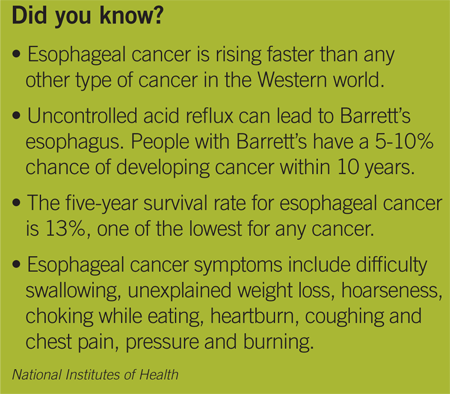Is Your Diet Putting You At Risk?
 The incidence of esophageal cancer is increasing faster than any other cancer in the Western world—in large part because of drinking, smoking and obesity. From 1975 to 2000, esophageal disease increased 400%, and experts predict that by 2020, the disease could afflict more people than colorectal cancer.
The incidence of esophageal cancer is increasing faster than any other cancer in the Western world—in large part because of drinking, smoking and obesity. From 1975 to 2000, esophageal disease increased 400%, and experts predict that by 2020, the disease could afflict more people than colorectal cancer.
“Overeating, smoking and drinking alcohol can weaken the valve between the stomach and the esophagus, and, as a result, patients end up with bad gastroesophageal reflux disease (GERD),” said Dr. Ross Bremner, director of Norton Thoracic Institute.
The constant wash of acid that is the hallmark of GERD can alter the lining of the esophagus, causing Barrett’s esophagus, and, if that is not controlled, esophageal cancer can follow. Only 13% of people with esophageal cancer survive five years, one of the lowest of all cancer survival rates.
“I’m a big proponent of what we call Barrett’s surveillance,” said Bremner. “If we endoscope patients with Barrett’s every year or two, we can watch the progression and, in most cases, prevent esophageal cancer.”
 Norton Thoracic Institute boasts many high-tech tools for the diagnosis of esophageal disease, including the Valley’s only confocal endomicroscopy, a powerful microscope used to diagnose esophageal cancer; high-resolution manometry to measure swallowing contractions; pH and impedance testing to determine how much reflux a patient is having; and dedicated continuous digital esophagography to provide a real-time movie of a patient’s swallowing.
Norton Thoracic Institute boasts many high-tech tools for the diagnosis of esophageal disease, including the Valley’s only confocal endomicroscopy, a powerful microscope used to diagnose esophageal cancer; high-resolution manometry to measure swallowing contractions; pH and impedance testing to determine how much reflux a patient is having; and dedicated continuous digital esophagography to provide a real-time movie of a patient’s swallowing.
“Esophageal cancer is a tough disease,” said Bremner. “With John and Doris Norton’s generous gift, we plan to expand our research into earlier detection methods and improved treatments for this devastating disease.”
Norton Thoracic Institute researchers are already working with University of Arizona researchers on techniques to prevent the progression of Barrett’s to esophageal cancer. “We are really excited about this collaboration,” said Bremner. “The best way to impact this disease will be through early detection and prevention, and that's where we will be concentrating our efforts.”